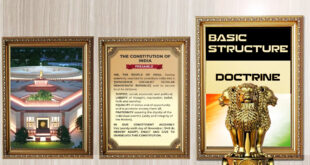- Prime Minister of India alleged that the Congress was “openly advocating” Karnataka’s secession from the Indian Union, by using the phrase ‘sovereignty of Karnataka’.
- Sovereignty is simply the idea of having supreme authority over a defined territory.
- From the 17th century onwards, Western philosophers used the concept to describe the supremacy of the state over the people being governed.
Thomas Hobbes:
In exchange for the protection offered by the government to its people, and its role in keeping society cohesive and at peace through its control over law and order, the state had a legitimate claim to sovereignty.
Sovereignty under India’s Constitution
- The word sovereignty appears in the beginning of the Preamble to the Constitution of India, as the first attribute of the independent republic of India.
- WE, THE PEOPLE OF INDIA, having solemnly resolved to constitute India into a SOVEREIGN SOCIALIST SECULAR DEMOCRATIC REPUBLIC.
- Sovereignty’ is invoked in the Indian Constitution to declare the ultimate sovereignty of the people of India and that the Constitution rests on their authority.
Sovereignty is mentioned in the Constitution under Fundamental Duties under Article 51A(c):
- It is the duty of all citizens to uphold and protect the sovereignty, unity and integrity of India.
- It is also mentioned in the oaths for positions like the Chief Justices, Union Ministers and Members of Parliament under the Third schedule:
- I will bear true faith and allegiance to the Constitution of India as by law established, that I will uphold the sovereignty and integrity of India
Relationship of the Indian states with the sovereign Union
- Article 1(1) of the Constitution sets out the fundamental relationship between the states and the Centre: India, that is Bharat, shall be a Union of States.
- The Indian federation is not a result of an agreement by the units, and
- The component units have no freedom to secede or break away from it.
provisions of the Constitution attest to the superior position of the Centre
- In India, except in a few specified matters affecting the federal structure, the States need not even be consulted in the matter of amendment to the bulk of the Constitution.
- Governors in states, seen as representatives of the Union in the States, are appointed “during the pleasure” of the President.
- The Sixteenth Amendment of 1963, amending Article 19(2) of the Constitution, which details the “reasonable restrictions” on the right to freedom of speech (under Article 19), laid down that even the advocacy of succession will not be protected under law.
- The right to alter the boundaries of states and to create new states lies with Parliament alone.
- The Constitution offers no guarantee to the States against their territorial integrity without their consent since it was not a result of an ‘agreement’ between the States.
SOURCE: THE HINDU, THE ECONOMIC TIMES, PIB
 Chinmaya IAS Academy – Current Affairs Chinmaya IAS Academy – Current Affairs
Chinmaya IAS Academy – Current Affairs Chinmaya IAS Academy – Current Affairs



